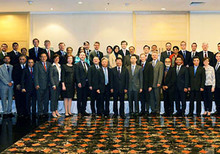
BEIJING: Representatives from 50 founding countries, including India, signed an agreement that provided the legal framework for the China-led $100 billion multilateral Asian Infrastructure Investment Bank (AIIB). The 60-article agreement specified each member's share as well as governance structure and policy-making mechanism of the bank, which is designed to finance infrastructure in Asia.

The delegates from 50 founding countries gathered at the Great Hall of the People for the signing ceremony. Australia was the first country to sign the agreement, followed by 49 other members. Seven more countries are due to sign by the end of the year.
The AIIB will have authorised capital of $100 billion, and Asian countries will contribute to up to 75 per cent of the total capital. Each member will be allocated a share of the quota based on their economic size, according to the agreement. "China, India and Russia are the three largest shareholders, taking a 30.34 per cent, 8.52 per cent, 6.66 per cent stake, respectively. Their voting shares are calculated at 26.06 per cent, 7.5 per cent and 5.92 per cent," state-run Xinhua news agency reported.
The AIIB is designed to finance infrastructure construction in the continent. The AIIB, which will have billions of dollars to lend, is expected to go into operation later this year. Speaking at the signing ceremony, China's Finance Minister Lou Jiwei said the AIIB will uphold high standards and follow international rules in its operation, policy-making and management to ensure efficiency and transparency. After signing the agreement, representatives of prospective founding members will take the agreement back to their respective countries for legal adoption processes, the Chinese Finance Ministry said.
The U.S. and Japan, which oppose the AIIB, are the most prominent countries not to join. The establishment of the new financial institution is seen as a diplomatic win for China, the world's second largest economy.
The AIIB was proposed by President Xi Jinping in October 2013. A year later, 21 Asian nations, including China, India, Malaysia, Pakistan and Singapore, had signed an agreement to establish the bank, which will be headquartered in Beijing. The AIIB is seen as a rival to the World Bank and Asian Development Bank.
The AIIB will have authorised capital of $100 billion, and Asian countries will contribute to up to 75 per cent of the total capital. Each member will be allocated a share of the quota based on their economic size, according to the agreement. "China, India and Russia are the three largest shareholders, taking a 30.34 per cent, 8.52 per cent, 6.66 per cent stake, respectively. Their voting shares are calculated at 26.06 per cent, 7.5 per cent and 5.92 per cent," state-run Xinhua news agency reported.
The AIIB is designed to finance infrastructure construction in the continent. The AIIB, which will have billions of dollars to lend, is expected to go into operation later this year. Speaking at the signing ceremony, China's Finance Minister Lou Jiwei said the AIIB will uphold high standards and follow international rules in its operation, policy-making and management to ensure efficiency and transparency. After signing the agreement, representatives of prospective founding members will take the agreement back to their respective countries for legal adoption processes, the Chinese Finance Ministry said.
The U.S. and Japan, which oppose the AIIB, are the most prominent countries not to join. The establishment of the new financial institution is seen as a diplomatic win for China, the world's second largest economy.
The AIIB was proposed by President Xi Jinping in October 2013. A year later, 21 Asian nations, including China, India, Malaysia, Pakistan and Singapore, had signed an agreement to establish the bank, which will be headquartered in Beijing. The AIIB is seen as a rival to the World Bank and Asian Development Bank.

 RSS Feed
RSS Feed
